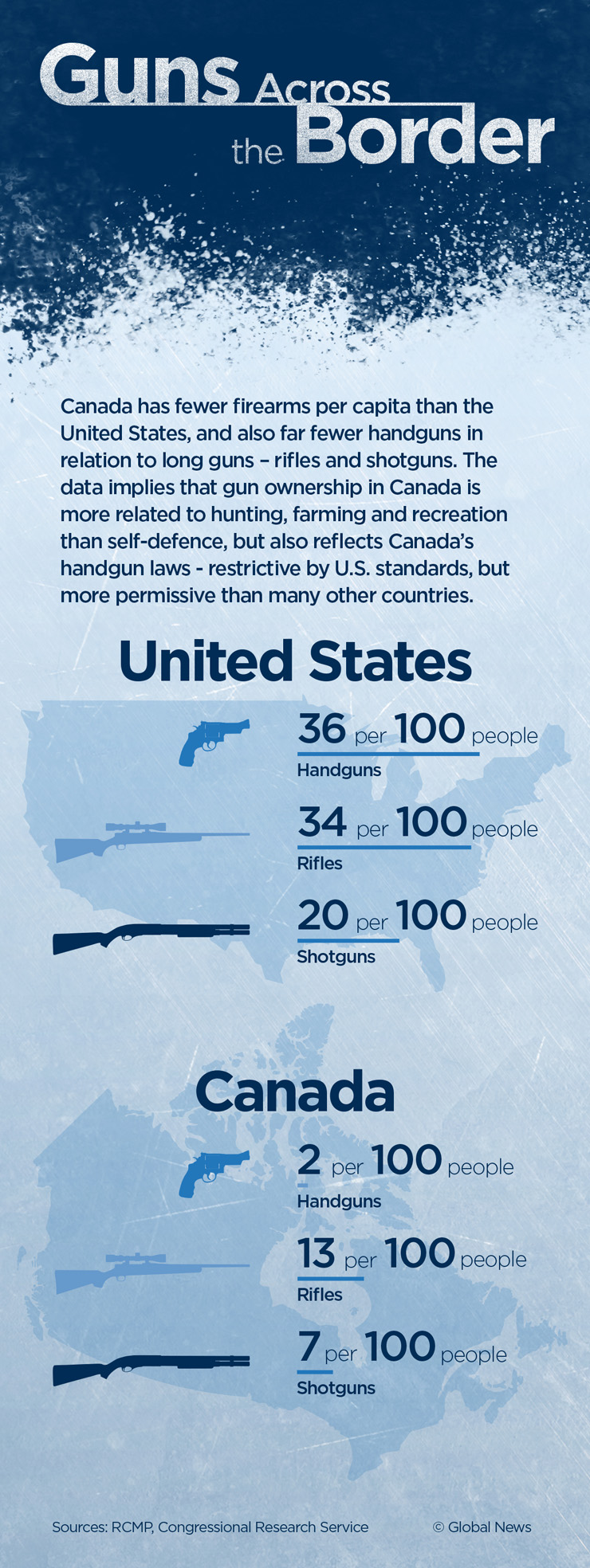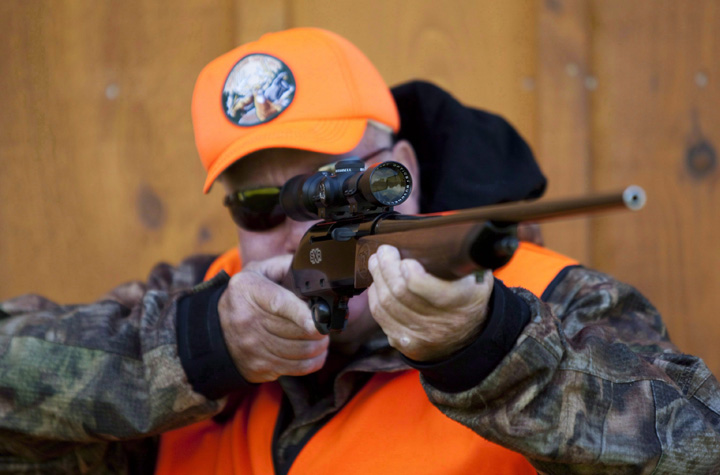Quebec is likely to lose a Supreme Court decision Friday morning over its plans to create its own long gun registry, but the decision may have a sting in its tail for Conservatives in Quebec, a constitutional scholar warns.

The case is not so much about whether Quebec will be allowed to have a long gun registry, as it is about whether it will be forced to start one from scratch without the federal data. The court heard arguments last October.
“I’d be surprised if Quebec won,” says University of Toronto law professor David Schneiderman.
Quebec’s main argument is that ‘co-operative federalism’ obliges Ottawa to help it start its own registry by turning over the data.
“For the most part the argument that there are these independent obligations that arise from these principles, that is independent of the text, hasn’t really been given much consideration by the courts,” Schneiderman explains.
But the federal Conservatives’ refusal to hand over the data – obstructiveness or principled consistency, depending on your point of view – will be unpopular in Quebec, Schneiderman says.
“There’s a forthcoming election. (The Conservatives) are fighting for their life in Quebec, around Quebec City, and they’re fighting hard to gain some seats there, and the release of this judgment is an opportunity, maybe, to remind Quebec voters about why they don’t like the Harper government. It might not work in their favour.”
Long gun registry data for the rest of Canada was deleted in the fall of 2012, but Quebec’s data was saved as the case wound its way slowly through the courts.
- Posters promoting ‘Steal From Loblaws Day’ are circulating. How did we get here?
- Canadian food banks are on the brink: ‘This is not a sustainable situation’
- Video shows Ontario police sharing Trudeau’s location with protester, investigation launched
- Solar eclipse eye damage: More than 160 cases reported in Ontario, Quebec
If the court holds for the federal government, Quebec long gun data held by the RCMP will be destroyed; Quebec will be free to set up its own registry, but won’t have the federal data to work with as a starting point. Schneiderman calls the task “obviously prohibitive, from all kinds of angles.”
If Quebec wins, they will be given the federal data.
The Quebec long gun registry data contains records of about 1.6 million guns, data obtained by Global News under access-to-information laws shows. Most are rifles, but about 40 per cent are shotguns.
Quebec’s Liberal government has not clearly said whether they would try to set up a registry without legacy data.
“We’ll analyze everything, evidently in the current budgetary context, but also in light of concerns raised by Quebec over numerous years,” Justice Minister Stéphanie Vallée said last fall, according to a report in the Montreal Gazette.
If Quebec loses the case and then walks away from the task of finding over a million guns with no starting point, it will mean the final end of long gun registration, 20 years after the original law was signed into law in May of 1995.
READ MORE: Myth: The long gun registry is still out there, somewhere
The broader question relates to how unilaterally the federal government, or the provinces, can operate in an area of shared jurisdiction.
Quebec argues that since gun control is an area that Ottawa and the provinces share, the federal government can’t destroy data related to a province over its objections. Ottawa says that just as Parliament had the right to create the registry, it has the right to order its destruction.
A Quebec registry, being provincial law, wouldn’t have the same teeth as the former federal long-gun registry, Ottawa lawyer Solomon Friedman explains. Gun owners who chose to ignore or defy the old long gun registry ran the risk of criminal conviction and prison time.
However, a draft bill that Quebec introduced in 2013 for a provincial registry – which never became law – relied on fines, and extensive search powers, for compliance. The bill was introduced by Stéphane Bergeron, public safety minister in the then PQ government.
“The fines are not insignificant,” Friedman says. “Although they start off at $500 to $1,000 for some offences, they double for every subsequent offence. It gets really expensive really fast.”
Quebec gun owners who flouted the proposed law could also lose their hunting licences, Friedman says.
Ottawa acknowledges that the Quebec government can create a long gun registry if it wants to, but refuses to help set it up.
In June of 2000, the Supreme Court ruled that gun control was an area of federal jurisdiction, since it has more to do with public safety than with the regulation of property, which the provinces control.
That case was in some ways the reverse of the current one – Alberta was arguing that the creation of the long gun registry was unconstitutional, and the (then-Liberal) federal government was defending it.
“The issue was: Does the federal government have the right to enact, and repeal, a firearms law? The answer, undoubtedly, is yes,” Schneiderman says. “The question, in this case, could be settled on that basis alone, and the federal government was making that very argument. It’s within our jurisdiction, Quebec can’t control how we exercise that jurisdiction, and that’s the end of the story.”
So why did the Supreme Court take the current case in the first place if the main issue was apparently settled 15 years ago? The court picks the cases it decides to hear for particular reasons – if it wants to clarify the law in a disputed area, for example. Why this one?
“It has national significance, because it has importance to Quebec, and Quebec is making a claim about federal power, and about co-operative federalism. These are issues that would be of concern to other provinces, so I think they could justify taking the case. It’s an opportunity to talk about federalism, if it wants to.”
Ottawa and the provinces have locked horns over criminal law before, says Osgoode Hall law professor Benjamin Berger. What the criminal law actually says is up to Ottawa, but beyond that, the provinces have a strong role:
“From time to time over the years something of a battle over issues around criminal law and public safety and whether they are really as exclusively federal as we imagine them to be, or whether the provinces have a greater role to play, have bubbled up,” he says. “This is a very interesting, very important instance of that, because you can see how strong the interests are on both sides of the ledger.”
Since the 2000 decision, the court’s membership has completely turned over, except for Beverley McLachlin, then and now its chief justice.
The lower courts were divided over Quebec’s position: the Quebec Superior Court ruled for the province, and the Quebec Court of Appeal ruled against.
Programmers at the RCMP deleted the registry, other than the Quebec data, in October of 2012.
–
Whatever its flaws and controversies, the long gun registry was a rich source of data about gun ownership in Canada. Global’s redacted copy of the registry, obtained before any data was deleted, is a rich source of information about Canadians and their firearms.
Here are two graphics that show what we learned from the registry:
Gun thieves are picky, and they’re much more interested in some kinds of guns than others. Thirteen years of gun theft data shows a preference for handguns over shotguns and rifles, and for semi-automatic actions in rifles and handguns.

JANET CORDAHI
One difference between Canada and the United States is the contrast in attitudes to gun ownership and firearms themselves. One thing that stands out in the graph below is that there are fewer firearms in Canada compared to the United States, proportionate to population, but also far fewer privately owned handguns in proportion to long guns.
If Canada had American rates of private handgun ownership, we would have over 12 million handguns, instead of the 700,000 that we actually have.

JANET CORDAHI




Comments